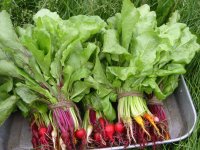
Today--the first day of summer, a truly glorious day. Seems like the blackflies were winding down, the air was clear and bright, nothing broke down, and I feel like we are accumulating some momentum out in the fields. We're doing good work, everyone is getting tan and arms are looking strong, and the greens we're harvesting are excellent. This year I've decided to try to keep the remay tunnels over the chard and basil even as we are harvesting them--extra work to open and close them each morning, but I'd love to try to prevent tarnish bug damage without having to spray pyrethrins so often. So far, so good.
For years, I've been meaning to write an informational sheet about our farming practices, our goals, and choices. Each year more and more customers want to know if we are organic. The quick and disappointing answer is no--the long and complete answer is complex and often challenging to succinctly address. I think back to last fall when I was in the market for apples to sell at Chase's Daily and upon asking the grower about her spraying practices was taken aback by her quick and angry retort. She clearly had a chip on her shoulder--no, she was not organic, and she was not sorry, she sells an excellent, well-grown, well-picked product, at a reasonable price and I could take or leave it. I was merely curious( I don't think she realized that she was preaching to the choir), as I had had some conversations over the years with orchardists that had also chosen the non-organic route in pursuit of their own sustainability. That brings me back to us--Chase Farm--and our sustainabilty, and I'll try to keep the chip off my shoulder.
Our goal is to grow the highest quality produce and sell it at a reasonable price to our local community. As a rule, we choose to use biologically derived pesticides or their synthetic counterparts. We use row cover extensively to diminish the need to spray. We spray only when there is evidence of a problem (integrated pest management). We take every precaution to prevent the unnecessary death of beneficials. All spraying is done with a back-pack sprayer. No farm employees do any of the spraying. While not innocuous, the pesticides and fungicides we use on the farm require minimal protective gear for the applicator (Addison), and have short re-entry and days to harvest restrictions. They are not necessarily approved for organic growers, though some are, they are the best products we have found to control our specific problems with the least risk to applicator, eater, environment, and beneficials.
Fertility is essential for well-grown produce. Every fall, our agriculture consultant, Lauchlin Titus, takes soil samples for detailed soil tests. We have a mix of chemical fertilizer prepared specifically for our fields. In addition, we trade with a dairy farmer some fields to be cultivated in cow corn for some mountains of cow manure which we use for some heavy feeder crops.
Weed control is accomplished by hand, many hands, really, and cultivation with a couple different tractors and a trusty rototiller. We use black plastic mulch extensively. And, we grow annual rye grass between the black plastic mulch as a living mulch for weed control and improved tilth of our heavy soil. This year about half of the plastic mulch we are using is a cornstarch mulch imported from Italy--very expensive, but exciting technology. Also, one of our veteran farm workers is investigating the benefits of using cover-crops more widely in our cultivation practices as a project for school--we look forward to her discoveries.
We are good growers. Our fields are full of life--birds, bugs, snakes, small and big mammals, little tree frogs and the occasional secretive newt. There is a family of Canadian geese, six goslings being raised, as we scurry to put up fencing around each new batch of tender transplants in defense of their voracious appetites. Each year we watch the kildeer raise their chicks in the early summer and share the fields with crowds of turkeys in the fall. We try a host of new varieties every year--heirlooms and hybrids--in an effort to grow the very best for our customers and ourselves. We are always learning and trying new things and preserving and improving on our piece of farmland. Please enjoy our produce--we certainly love growing it.

0 Comments:
Post a Comment
<< Home